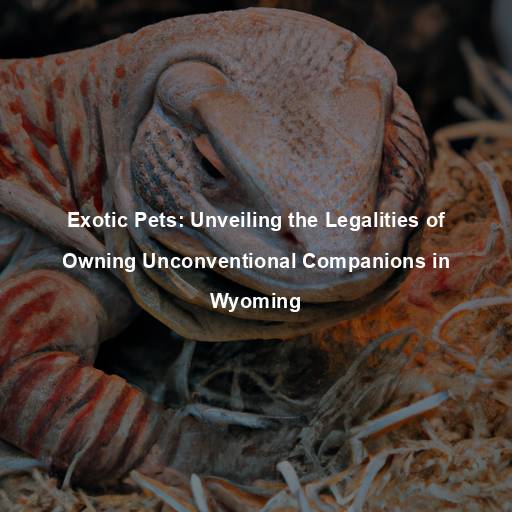Which Exotic Pets Are Legal: A Comprehensive Guide
Last Updated on November 20, 2023 by Evan
Contents [hide]
- 1 Understanding the Fascination with Exotic Pets
- 2 Mammals: From Furry Companions to Exotic Marvels
- 3 Reptiles: Cold-Blooded Charmers
- 4 Birds: Feathered Friends and Their Legal Status
- 5 Invertebrates: Small Marvels with Big Impact
- 6 Ethical Considerations: Beyond Legalities
- 7 The Role of Conservation
- 8 The Emotional Connection: Bonding with Exotic Pets
- 9 Embracing the Wonder of Exotic Pets
- 10 FAQs – Which Exotic Pets are Legal?
- 10.1 What are exotic pets?
- 10.2 Are all exotic pets legal to own?
- 10.3 How can I find out if a specific exotic pet is legal in my area?
- 10.4 Do exotic pets require special permits or licenses?
- 10.5 Which exotic pets are commonly legal to own?
- 10.6 Are there any endangered or protected species that are illegal to own as exotic pets?
- 10.7 Can I release my exotic pet into the wild if I can no longer care for it?
Understanding the Fascination with Exotic Pets
Humans have forever been bewitched by the allure of exotic pets, those whimsical creatures that effortlessly captivate our senses and ignite our inquisitive spirits. The indomitable charm of a Bengal tiger or the mischievous escapades of a capuchin monkey have an extraordinary appeal that transcends the ordinary realm of traditional pets. Nevertheless, treading the enigmatic path of acquiring an exotic companion demands an acute awareness of the convoluted legalities that encase their ownership. In this all-encompassing manual, we embark on an expedition into the realm of exotic pets, unraveling the enigma of the lawful creatures bestowed upon us.
Owning an exotic pet is not as simple as walking into a pet store and making a purchase. Various laws, regulations, and permits govern the ownership of exotic animals, and they can vary significantly depending on your location. It is essential to familiarize yourself with the specific regulations in your area to ensure compliance and avoid any legal repercussions. Let’s delve into the various categories of exotic pets and their legal status in different regions.
Mammals: From Furry Companions to Exotic Marvels
Primate Pals: Monkeys and Apes
Primates, those fascinating creatures that inhabit the realm between humans and animals, have always held a beguiling allure for those with a deep appreciation for the natural world. Their remarkable intelligence, undeniable strength, and intricate social dynamics have sparked a flurry of regulations governing their ownership. From stringent restrictions to outright bans, owning a primate as a pet has become a quagmire of perplexing rules around the globe. The reasoning behind these perplexing guidelines stems from a genuine concern for the welfare and safety of these enigmatic beings in the context of domesticity.
Feline Frenzy: Wild Cats as Pets
The allure of owning a wild cat, such as a serval or Bengal tiger, is undeniable. These majestic creatures possess an unmatched grace and beauty. However, the legal landscape regarding owning wild cats as pets is a complex one. In some regions, it is entirely illegal to own any wild cat species, while others may require special permits and licenses.
Canine Charisma: Wolves and Wolf-Hybrids
Throughout history, the enigmatic allure of wolves has captivated the human imagination, permeating our mythology and folklore. The mesmerizing kinship they share with our faithful canine companions only adds to their mystique, prompting some individuals to contemplate the idea of having a wolf or wolf-hybrid as a pet. Yet, the legal landscape surrounding the ownership of these majestic creatures is a labyrinth of perplexity and complexities. From navigating the intricate web of permits and enclosures to adhering to stringent regulations, owning a wolf demands a deep understanding of the legal framework.
Other Mammalian Marvels
Beyond primates, wild cats, and wolves, there is a wide array of other exotic mammals that capture the imagination of pet enthusiasts. From sugar gliders to kinkajous, each species comes with its own set of legal considerations. It is essential to research and understand the specific regulations governing the ownership of these animals in your area. Additionally, it is vital to consider the ethical implications and the unique care requirements that come with owning exotic mammals.
Reptiles: Cold-Blooded Charmers
Reptiles possess an undeniable allure, captivating enthusiasts with their ethereal splendor and intriguing idiosyncrasies. Yet, the realm of reptile ownership is a labyrinth of legal vagaries, an enigma that beguiles and bewitches. Delving into the intricate tapestry of regulations, we unearth a mosaic of perplexing intricacies that surround these remarkable companions. Let us unravel the clandestine veil veiling the legal standing of a few illustrious reptilian kin.
Snakes: Slinky Serpents
The enigmatic allure of snakes has captivated and confounded humanity throughout history. They provoke a complex range of emotions, with some embracing these serpents as beloved pets, while others recoil in dread. In a perplexing twist, the rules governing snake ownership fluctuate dramatically from one region to another. The absence of any restrictions in certain areas sharply contrasts with the stringent permit requirements and precise protocols enforced elsewhere.
Lizards: Captivating Crawlers
The mesmerizing charm of lizards, with their enigmatic quirks and perplexing allure, has enraptured the hearts of reptile aficionados far and wide. From the resplendent bearded dragons, with their majestic beards, to the enchanting geckos, with their ability to defy gravity, the realm of lizards unfolds with an abundance of diverse species for passionate enthusiasts to explore. Nevertheless, it is paramount to navigate the intricate labyrinth of legalities that govern the ownership of these captivating creatures. A dance with the law unfolds, where some species may require permits or be subjected to regulations, while others may bask freely without any restrictions.
Turtles and Tortoises: Ancient Delights
Turtles and tortoises, with their slow and deliberate movements, have a certain charm that captivates many pet lovers. However, it is crucial to navigate the legal landscape surrounding these ancient reptiles. Some jurisdictions may restrict the ownership of certain turtle and tortoise species due to concerns about the spread of diseases and the impact on native ecosystems. Researching the specific regulations in your area is essential to ensure compliance and the well-being of these fascinating creatures.
Birds: Feathered Friends and Their Legal Status
Parrots: Colorful Chatterboxes
Parrots, known for their stunning feathers and uncanny ability to imitate, have captivated pet enthusiasts for ages. These clever and sociable creatures possess a remarkable knack for bonding with their human counterparts. However, regulations governing parrot ownership have transitioned into a puzzling landscape, sparked by concerns about their well-being and the repercussions of the exotic pet industry. Various nations have imposed limitations on the import and possession of specific parrot breeds.
Birds of Prey: Majestic Hunters
There is something truly captivating about the majestic birds of prey – the falcons, hawks, and owls that rule the skies with their hunting prowess and commanding charisma. However, it is not for the faint of heart or unprepared enthusiasts to own these magnificent creatures. A deep reservoir of specialized knowledge and experience, alongside all the necessary permits, is indispensable in navigating the perplexing realm of bird of prey ownership. Stringent regulations are in place to protect these magnificent creatures and their human caretakers, making it imperative to seek guidance from experts and strictly adhere to legal requirements.
Invertebrates: Small Marvels with Big Impact
Tarantulas: Hairy and Harmless
For those who dare to venture into the uncharted territory of tarantula ownership, the journey can be both thrilling and perplexing. These captivating creatures, with their eight-legged majesty, have seen a surge in popularity as exotic pets. While it may come as a surprise, the legal landscape surrounding tarantula ownership is often less restrictive when compared to other unconventional companions. Nevertheless, it is vital to navigate the intricate web of regulations that govern your local jurisdiction, as each corner of the world may hold its own enigmatic conditions.
Scorpions: Ancient Stingers
Scorpions, those enigmatic creatures adorned with their ominous visage and formidable stingers, effortlessly capture our attention and ignite a peculiar blend of apprehension and intrigue. Curiously, owning scorpions as companions is an established practice in various locales, although one must navigate a labyrinth of prudence and comply with essential safety measures. Employing judicious care in managing these eight-legged wonders entails delving into their intricate behavioral patterns, providing habitats that mirror their needs, as well as being cognizant of preventive measures to circumvent inadvertent envenomation. Undertaking thorough research, coupled with consultation from experts in the field, serves as the vanguard for an enriching and secure journey shared between the scorpion and its keeper.
Ethical Considerations: Beyond Legalities
While it is essential to understand the legal status of owning exotic pets, it is equally crucial to consider the ethical implications. The exotic pet trade often involves the capture and breeding of animals under questionable conditions, leading to wildlife trafficking and animal welfare concerns. It is vital to support reputable breeders and rescue organizations that prioritize the well-being of animals and contribute to conservation efforts. Responsible ownership goes hand in hand with ethical considerations, ensuring the welfare and preservation of these remarkable creatures.
Licensing and Permits: A Legal Necessity
One of the key challenges in owning an exotic pet is the acquisition of the necessary licenses and permits. These documents serve as proof that you have met the legal requirements and are capable of providing appropriate care for the animal in question. Depending on the species and your location, obtaining these licenses may involve demonstrating knowledge and experience, providing suitable enclosures, and adhering to specific regulations. It is crucial to consult with local authorities or exotic pet organizations to ensure you understand and fulfill all necessary legal obligations.
Specialized Care: Meeting Unique Needs
Exotic pets often have specialized care requirements that differ significantly from those of conventional pets. From temperature and humidity control to dietary considerations and behavioral enrichment, providing appropriate care can be a complex task. Researching and understanding the specific needs of your chosen exotic pet is crucial to ensure their well-being. Consulting with experts, such as veterinarians specializing in exotic animals or experienced exotic pet owners, can provide valuable insights and guidance on providing optimal care.
Financial Considerations: The Cost of Exotic Pet Ownership
Owning an exotic pet can be financially demanding. The initial cost of acquiring the animal, along with the necessary enclosures, equipment, and specialized supplies, can be substantial. Additionally, ongoing expenses such as veterinary care, diet, and habitat maintenance must be factored into the budget. It is essential to consider the long-term financial commitment of owning an exotic pet and ensure you have the means to provide for their needs throughout their lifespan.
Public Perception and Education: Addressing Misconceptions
Exotic pet ownership often faces public scrutiny, with concerns raised about animal welfare, public safety, and the impact on conservation efforts. It is crucial for exotic pet owners to be ambassadors for responsible ownership and education. By sharing knowledge, dispelling misconceptions, and advocating for ethical practices, we can help foster a better understanding of the unique challenges and rewards associated with owning exotic pets. Engaging in open and respectful dialogue with others can contribute to a more informed and empathetic society.
The Role of Conservation
Conservation through Captive Breeding Programs
Captive breeding programs have emerged as a key player in the complex dance of conservation, seeking to protect endangered or threatened species. These controlled environments act as temporary sanctuaries, taking a load off the weary shoulders of wild populations and allowing them to catch their breath. By participating in reputable captive breeding programs, exotic pet owners become unlikely guardians, fostering the dual cause of species preservation and individual animal well-being. It is imperative to rally behind organizations that champion conservation and champion sustainable captive breeding practices, harmonizing the delicate balance between human intervention and nature’s enduring symphony.
Responsible Sourcing: Ethical Considerations
When considering an exotic pet, it is crucial to ensure that the animal has been sourced ethically. Supporting reputable breeders or adopting animals from rescue organizations helps discourage the illegal wildlife trade and supports efforts to combat wildlife trafficking. Responsible sourcing also ensures that animals have been bred and raised in environments that prioritize their welfare and provide appropriate care. By making informed decisions regarding where we acquire our pets, we can contribute to the preservation of species and promote ethical practices.
Education and Habitat Preservation
Having a unique and fascinating pet can be so much more than just a personal enjoyment. By proudly displaying our exotic companions, we have the power to ignite curiosity and inspire discussions about the fragile state of their natural habitats. It is through these conversations that we can increase awareness about the grave threats these animals face in the wild, and the urgency of preserving their precious ecosystems. So, as exotic pet owners, let’s not just revel in the wonder of our companions, but also actively engage in educational initiatives, support conservation organizations, and join hands in restoring their habitats, thus making a meaningful impact on the future of these extraordinary species.
The Emotional Connection: Bonding with Exotic Pets
Building Trust and Establishing Relationships
Forming a bond with an exotic pet requires patience, understanding, and respect for their unique needs. Many exotic animals may have experienced trauma or come from challenging backgrounds before becoming part of our lives. Building trust through positive reinforcement, consistent care, and understanding their individual personalities is essential. With time and effort, a deep and meaningful connection can be established, enriching both the lives of the exotic pet and their human companion.
Enrichment and Mental Stimulation
In a world brimming with captivating creatures, it is imperative that we unlock the secrets to their boundless vitality. Exotic pets, much like their counterparts in the wild, yearn for a tapestry of mental and physical engagement. A delightful array of puzzle feeders, tantalizing toys, and avenues for exploration beckon these extraordinary beings towards a life unfettered by monotony. Dive into the depths of their innate instincts, weaving together a symphony of natural behaviors that dance harmoniously with their daily existence.
The Responsibility of Ownership
Embarking on the exhilarating journey of owning an exotic pet sparks enthusiasm and awe, but let’s not forget the perplexing facets that accompany this unique responsibility. It’s crucial to ponder over the profound implications that come with having an exotic companion – from their remarkable lifespan to their intricate and specific care requirements – as well as the potential disruption it might bring to your daily routine. Being a responsible exotic pet owner necessitates an unwavering dedication to the well-being of your extraordinary friend, a constant quest for knowledge, and an adaptable nature to cater to their ever-changing needs.
Embracing the Wonder of Exotic Pets
Exotic pets have a unique ability to inspire awe, curiosity, and a deep appreciation for the diversity of life on our planet. As we navigate the legal, ethical, and practical aspects of owning these remarkable creatures, it is crucial to approach the journey with a sense of wonder and respect. By understanding and fulfilling our responsibilities as exotic pet owners, we can contribute to the well-being of these animals, support conservation efforts, and forge meaningful connections that enrich our lives and those of our extraordinary companions.
FAQs – Which Exotic Pets are Legal?
What are exotic pets?
In a world filled with conventional pets like cats and dogs, there exists a captivating realm of non-traditional animals that defy the norms of domestication. Exotic pets, hailing from far-away lands and regions beyond our imagination, bring a burst of mystery and intrigue into our lives. From slithering reptiles to melodious birds, from curious rodents to enigmatic arachnids, this diverse menagerie offers a glimpse into the extraordinary and perplexing wonders of the animal kingdom. Venture into this captivating sphere and uncover the hidden allure of our unconventional companions, from aquatic fish to majestic wild mammals.
Are all exotic pets legal to own?
It’s a fascinating world out there when it comes to owning exotic pets, but let’s not forget that legality is a multifaceted puzzle that can vary wildly. Different countries, regions, even states, have their unique perspectives on what’s allowed and what’s not. Conservation efforts for certain species play a crucial role, while potential health and safety concerns also come into play. Navigating this perplexing landscape requires diligent research, consulting with the right authorities, and seeking expert advice before embarking on any exotic pet ownership adventure.
How can I find out if a specific exotic pet is legal in my area?
When it comes to bringing home an unconventional companion, it’s essential to tread carefully through the labyrinth of legality. Unraveling the enigma of whether a captivating creature is allowed in your neck of the woods requires delving into the realm of local authorities and governmental agencies. Seek out the wise guardians of wildlife departments, the watchful eyes of animal control offices, or the gatekeepers of state departments overseeing wild animal management, for they hold the key to unlocking the current and perplexing regulations surrounding the ownership of exotic animals.
Do exotic pets require special permits or licenses?
In many cases, exotic pets do require special permits or licenses to ensure they are being kept in appropriate and controlled environments. Permits and licenses help monitor and regulate the ownership of these animals, ensuring their well-being and the safety of individuals involved. The specific documentation needed can vary depending on the species, so it is crucial to research and follow all legal requirements before obtaining an exotic pet.
Which exotic pets are commonly legal to own?
Exotic pet laws differ widely, so it is challenging to provide a definitive list of commonly legal exotic pets. However, some relatively common exotic pets that are often legal to own include certain species of reptiles like geckos, snakes, and turtles; small mammals such as hedgehogs, sugar gliders, and ferrets; some bird species like parrots and cockatiels; and certain varieties of fish and invertebrates for aquariums.
Are there any endangered or protected species that are illegal to own as exotic pets?
Yes, there are several endangered or protected species that are illegal to own as exotic pets. The international trade of these animals is regulated by the Convention on International Trade in Endangered Species of Wild Fauna and Flora (CITES) and various national laws. Examples of these species include certain primates like chimpanzees and orangutans, big cats such as tigers and cheetahs, and various exotic birds like parrots and birds of prey. Owning these species poses significant conservation concerns and is strictly prohibited in most circumstances.
Can I release my exotic pet into the wild if I can no longer care for it?
It’s a perplexing and complicated situation when it comes to dealing with exotic pets we can no longer care for. While the thought of releasing them into the wild may seem like a burst of relief, it actually poses a significant threat to the delicate balance of local ecosystems and the precious wildlife that inhabits them. Instead, it’s crucial to embrace responsible rehoming options that prioritize the well-being and welfare of these animals. Consider reaching out to animal shelters, rescue organizations, or knowledgeable individuals with expertise in caring for exotic pets to navigate this challenging terrain with compassion and care.







